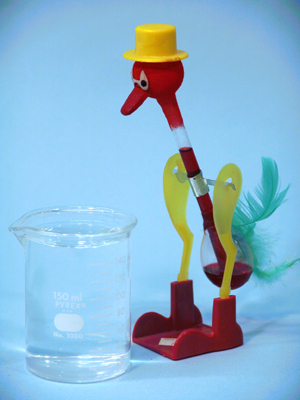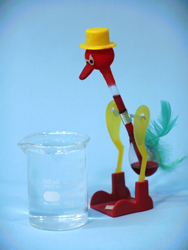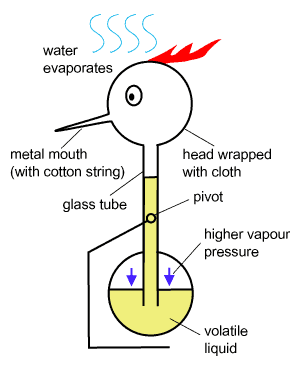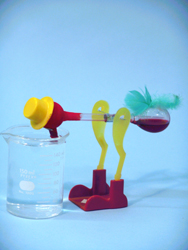|
Size: 1418
Comment:
|
← Revision 45 as of 2018-07-18 19:17:49 ⇥
Size: 3080
Comment:
|
| Deletions are marked like this. | Additions are marked like this. |
| Line 2: | Line 2: |
= Drinking Bird, 4C31.30 = |
= Drinking Bird, 4C31.30a = '''pira200 Listed''' |
| Line 6: | Line 6: |
| * '''Cabinet:''' Mechanic (ME), Waves & Sound (WS).... * '''Bay:''' (A? or B?) * '''Shelf:''' #1,2,3.. (Use "T" for items that are on top of that cabinet bay) |
|
| Line 10: | Line 7: |
| (attachment photo showing the fully set up demonstration) | * '''Cabinet:''' Thermodynamics Cabinet * '''Bay:''' (A2) * '''Shelf:''' #5 |
| Line 12: | Line 11: |
| '''Description:''' Also called Dippy Bird or Tippy Bird. Insert description of apparatus, its component, what it is demonstrating. |
{{attachment:4C31-30_02i-400.jpg}} |
| Line 16: | Line 13: |
| ||<:style="width: 60%" :40%>'''Equipment'''||<:30%>'''Location'''||<:25%>'''ID Number'''|| || || || || ||apparatus||ME, Bay B1, Shelf #2|| || ||all other parts||ME, Bay B1, Shelf #2|| || ||...||ME, Bay B1, Shelf #2|| || ||Possible supplies that are needed||Rode and Tack Cabinet|| || ||...|| In Lecture Halls|| || ||...|| Stock Cabinet || || ||...|| Stock Cabinet || || |
'''Description:''' Also called Dippy Bird or Tippy Bird. ||<40% style="" ;text-align:center">'''Equipment''' ||<30% style="text-align:center">'''Location''' ||<25% style="text-align:center">'''ID Number''' || ||Drinking Bird ||[[ThermoCabinetBayA2|TD, A2, Shelf #5]] ||<style="text-align:center">4C31.30a || ||150 ml. beaker ||Shelf over the sink area 2237 ||<style="text-align:center">NA || |
| Line 26: | Line 18: |
| '''Setup:''' | |
| Line 28: | Line 19: |
| 1. Make a Setup check list. 1. ... |
'''Setup:''' 1. Make sure that the drinking bird is assembled. If not do the following. . - Insert the Pivot into the openings at the top of the two legs as per the photo above and make the bird move to and fro freely. 1. Fill a 150 ml. beaker with cold water. 1. Put the head into the water and make it get wet completely and place the bird near the beaker, then the bird begin drinking water herself. (The more the head wet the fast the bird starts drinking the water.) |
| Line 32: | Line 29: |
| 1. List any Warnings.... 1. Demonstration may require practice. |
1. Do not break the tube( bird body). The red liquid ([[http://en.wikipedia.org/wiki/Dichloromethane#Toxicity|dichloromethane or methylene chloride]]) is an acute inhalation hazard and can cause optic neuropathy and hepatitis. 1. Be sure to keep the bird's body dry, otherwise the bird will stop to drink. 1. Be sure keep the bird's in the place where the air ventilating regularly. 1. If the bird's sways backward adjust the metal part straight or haend a little bit forward. '''Demonstration:''' Put water on the head of bird. When water evaporates, it makes the temperature of the glass head lower. This makes some of the red liquid (dichloromethane or methylene chloride) vapor to condense. From ideal gas law, the pressure in the head of the bird drop due to the lower temperature and condensation.The difference of the pressure between the head and base of the bird causes the red liquid to be pushed up from the base. Then the head of the bird become heavy and tips over. While the bird tips over, it makes air hole that can make red liquid flows back to the bottom bulb and this makes bird go back to its vertical position again. And this will occur periodically until the water on the head of bird dry. ||<style=""border:0""> {{attachment:4C31-30_03i.jpg}} ||<style=""border:0" ;text-align:center" |2> ||<style=""border:0" ;text-align:center" |2> {{attachment:DrinkingBird-01.gif}} ||<style=""border:0" ;text-align:center" |2> ||<style=""border:0" ;text-align:center" |2>Move: [[attachment:DrnkingBird.mpg]] || ||<style=""border:0""> {{attachment:4C31-30_04i.jpg}} || |
| Line 36: | Line 42: |
| '''Demonstration:''' | |
| Line 38: | Line 43: |
| Insert description of demonstration, how is the demonstration preformed. | |
| Line 40: | Line 44: |
| ||attachment:DrinkingBird-01.gif||attachment other photos|| ||attachment other photos||attachment other photos|| |
[[attachment:DrnkingBird.mpg]] |
| Line 45: | Line 48: |
| 1. List any references | 1. [[http://en.wikipedia.org/wiki/Drinking_bird|Wikipedia]] |
| Line 47: | Line 50: |
| [Insert a back link to main topic list] | [[ChangeofState|Change of State]] |
| Line 49: | Line 52: |
| [:Demonstrations:Demonstrations] | [[Demonstrations]] |
| Line 51: | Line 54: |
| [:Instructional:Home] | [[Instructional|Home]] |
Drinking Bird, 4C31.30a
pira200 Listed
Location:
Cabinet: Thermodynamics Cabinet
Bay: (A2)
Shelf: #5

Description: Also called Dippy Bird or Tippy Bird.
Equipment |
Location |
ID Number |
Drinking Bird |
4C31.30a |
|
150 ml. beaker |
Shelf over the sink area 2237 |
NA |
Setup:
- Make sure that the drinking bird is assembled. If not do the following.
- - Insert the Pivot into the openings at the top of the two legs as per the photo above and make the bird move to and fro freely.
- Fill a 150 ml. beaker with cold water.
- Put the head into the water and make it get wet completely and place the bird near the beaker, then the bird begin drinking water herself. (The more the head wet the fast the bird starts drinking the water.)
Cautions, Warnings, or Safety Concerns:
Do not break the tube( bird body). The red liquid (dichloromethane or methylene chloride) is an acute inhalation hazard and can cause optic neuropathy and hepatitis.
- Be sure to keep the bird's body dry, otherwise the bird will stop to drink.
- Be sure keep the bird's in the place where the air ventilating regularly.
- If the bird's sways backward adjust the metal part straight or haend a little bit forward.
Demonstration:
Put water on the head of bird. When water evaporates, it makes the temperature of the glass head lower. This makes some of the red liquid (dichloromethane or methylene chloride) vapor to condense. From ideal gas law, the pressure in the head of the bird drop due to the lower temperature and condensation.The difference of the pressure between the head and base of the bird causes the red liquid to be pushed up from the base. Then the head of the bird become heavy and tips over. While the bird tips over, it makes air hole that can make red liquid flows back to the bottom bulb and this makes bird go back to its vertical position again. And this will occur periodically until the water on the head of bird dry.
|
|
|
|
Move: DrnkingBird.mpg |
|
References:


